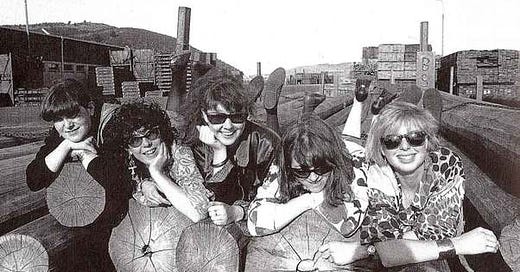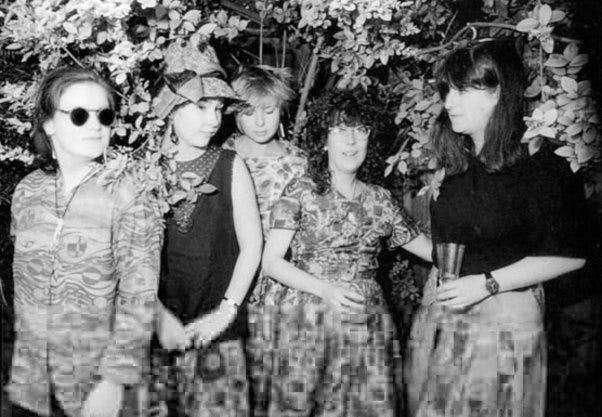Flying Nun's Sister Act: The Story of Look Blue Go Purple
Close to four decades later, Dunedin folk-pop group Look Blue Go Purple have been awarded the Taite Music Prize IMNZ Classic Record award.
Look Blue Go Purple, Dunedin, 1985 - Denise Roughan, Kathy Bull, Lesley Paris, Norma O'Malley, Kath Webster. Credit: Jeremy Freeman
Selected Works is a weekly (usually) newsletter by the Te Whanganui-a-Tara, Aotearoa (Wellington, New Zealand) based freelance music journalist, broadcaster, copywriter and sometimes DJ Martyn Pepperell, aka Yours Truly. Most weeks, Selected Works consists of a recap of what I’ve been doing lately and some of what I’ve been listening to and reading, paired with film photographs I’ve taken + some bonuses. All of that said, sometimes it takes completely different forms.
In 2017, I wrote a feature story for Noisey about Look Blue Go Purple to celebrate the release of their archival Still Bewitched compilation album through Flying Nun. In light of today’s news, I’ve updated the piece. You can read it below.
"They were one of the best bands of their time and the most undeservingly underappreciated," said Dunedin by way of Wellington musician Penelope Esplin of French for Rabbits, Grawlixes, The Prophet Hens, and Moon Lander. “They've inspired a generation of female musicians, most of whom stumbled across them and wondered why they weren't more famous."
Esplin was talking about the Dunedin five-piece Look Blue Go Purple (LBGP), one of the most important acts to emerge within seminal New Zealand indie-rock label Flying Nun's early 80s second wave. "After I discovered them, I covered "Safety In Crosswords" with The Prophet Hens at a show," Esplin continued. “I couldn't have been happier. I felt like I was introducing my generation to something really special."
Inspired by post-punk and the lo-fi pop psychedelia of Dunedin at the time, LGBP let feeling guide their buoyant group vocals, sun-kissed guitar strum, keyboards, flute and rollicking rhythms as they dovetailed together into a wistful and yearning sound that's aged exquisitely. Between 1983 and 1987, they recorded and released three EPs through Flying Nun, Bewitched (1985), LBGPEP2 (1986), and This Is This (1988) and toured regularly with the likes of The Chills, The Bats and Straightjacket Fits.
In 2017, Flying Nun released Still Bewitched, a retrospective compilation that collects all three of LBGP's EPs and a selection of unreleased live recordings. Four years in the making, it was an important step towards reasserting LBGP's rightful importance within Flying Nun's storied history. Seven years on from the release of Still Bewitched, LGBP has just been announced as the 2024 recipient of the Taite Music Prize IMNZ Classic Record award for 1991’s Compilation, which, as its title suggests, collects the music from their first three EPs in one place.
"You don't know what you're doing when you're in the middle of it, which isn't that important because you're doing it and you love what you're doing. In retrospect, we were really different and good."
"Going through our archives made me cry," admitted LBGP bassist Francisca Griffin (formerly Kathy Bull), the driving force behind Still Bewitched. "You don't know what you're doing when you're in the middle of it, which isn't that important because you're doing it and you love what you're doing. In retrospect, we were really different and good."
Look Blue Go Purple: Denise Roughan, Lesley Paris, Kath Webster, Kathy Bull, Norma O'Malley. Credit: Photo by Terry Moore
Speaking by phone from her home in Dunedin, where she works as a naturopath, Griffin was working through memories from three and a half decades ago. In the process, Griffin reflected on the era when she connected with her LBGP bandmates, Norma O'Malley, Denise Roughan, Kath Webster and Lesley Paris. After sizing each other up on the local music scene in 1983, LBGP started meeting up several times a week in the basement of a Dunedin record store.
"I would go into the store, and Lesley would put records in my face and make me buy them," Griffin remembered. "I don't know how we decided to start a band, but I remember Norma saying her friend Kath could play guitar so we could rope her in. Lesley was already drumming, so she was good. Denise was a fledgling guitar player, so some of our first songs didn't have much guitar in them because she and Kath were learning. I had my bass and synthesiser; Norma had her keyboards and flute."
With a shared love of the likes of The Velvet Underground, Television, Pere Ubu, The Slits, and The Raincoats, a healthy sense of humour ("We had a lot of in-jokes," Griffin laughed), and a sororal group relationship as connective threads, they struck upon something special.
"I don't think the idea of limitations even occurred to us. We'd look at what other bands were doing and go; we can do that! Let's just try it out. We're not good on guitar yet? That's okay; we'll do other things."
"We hung out all the time," Griffin said. "Some of us lived in the same places. We were all over each other's lives." More Do It Together than D.I.Y., they didn't let their early limitations hold them back. "I don't think the idea of limitations even occurred to us," Griffin laughed. "We'd look at what other bands were doing and go; we can do that! Let's just try it out. We're not good on guitar yet? That's okay; we'll do other things."
LBGP quickly progressed from the practice room to the local stages. In 1984, they played two consecutive shows at The Empire Hotel. "The bar was packed," Griffin said. "We sold out both nights. At the end of the second night, we had this big bag of money. I remember holding up a big wad of cash and saying, 'Look! Look what we did!'"
Emboldened, LBGP bought new music gear and started playing around the country. Live performances led to recording sessions in Auckland and Dunedin with audio engineers Terry Moore and Tex Houston. LBGP's first EP, Bewitched, was a breakout success, peaking at #21 in the New Zealand pop charts and staying in the Top 50 for close to eight weeks. "We were astonished and excited," Griffin enthused. "Look at that; they're all selling, people like it."
It was an era when local live music was thriving, and there was a unique energy in the air. "That ridiculous cultural cringe carry-on you get sometimes didn't occur to us much at all," Griffin said. "We were riding a wave, I guess? It was more like - where is the party tonight? Let's go! Everyone was busy playing, and the bars were full. You couldn't spend Saturday night on the internet back then."
Look Blue Go Purple, L to R: Kathy Bull, Denise Roughan, Kathryn Webster, Lesley Paris, Norma O'Malley. Credit: Photo by Terry Moore
Regardless of the energy of the time, their experiences as live musicians weren't always magical and could be downright horrible at times. Although being part of the Flying Nun scene located them inside an emerging musical counterculture, that counterculture still existed within a climate powered by rugby, cheap beer and the aftermath of New Zealand's third National Party government. "When the counterculture collided with the mainstream, it wasn't pretty," Griffin continued.
They had particularly bad experiences playing shows at the agricultural colleges in Palmerston North and Lincoln, so bad they skipped both of them on their next university tour. "There were a few places where we'd have boys giving us assholes," Griffin laughed. "We gave them double back." As they travelled around New Zealand, those darker moments were tempered by brand new audiences, audiences who owned their records and knew the words to their songs.
As five women playing together under the shadow of post-punk, LBGP was often labelled a feminist band by the media, a title they respectfully had, and continue to have, no interest in. "We did want to play with our friends who were women, but we didn't want to play with them because they were women," Griffin explained. “We were a band of five musicians who happened to be women. There are lots of musicians who want to get messages across, and kudos to them. We never wanted to get any messages across except, here are our songs."
“There are lots of musicians who want to get messages across, and kudos to them. We never wanted to get any messages across except, here are our songs."
Despite a promising run, after recording their third EP, This Is This, LBGP called it a day in 1987. Lesley wanted to go travelling, Griffin was pregnant with her first child, and things were changing. Over the decades that followed, their music acquired a cult following amongst Flying Nun fans in New Zealand and abroad. Things ramped up with YouTube, where even a cursory search throws up an impressive number of live performance videos from the 80s, and excellent music videos for crucial LBGP cuts like "Cactus Cat" and "Circumspect Penelope".
In retrospect, every upload contributed to a perfectly understated set-up for Still Bewitched's release in 2017. "Back in the day, I was eerily obsessed with collecting stuff of ours," Griffin reflects. "All kinds of bits of paper, posters, photos, live recordings." She might not have thought about why at the time, but in 2017, it was all finally starting to make sense. Seven years on, her efforts in the late 80s only seem more valid.
FIN.






